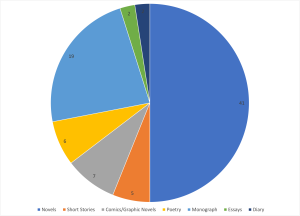Interlocutors: “The Firehose of Certainty” by Rumaan Alam, and “Ambivalence is Awesome” by Ian Leslie
Everybody knows that social media contain a lot of ranting and pontificating and vituperation. We now have access to many different channels for communicating our thoughts, and we fill those channels up with our opinions about things. Essentially, Alam’s piece is about second-guessing your opinions about things, and how the ways we communicate about things online encourages (forces?) us to convey a sense of certainty about those opinions that we rarely actually feel. Ambivalence is (comparatively) hard to convey briefly, and “I don’t know how I feel about this” is likely to get a lot less attention or response than “I love this” or, even more, “I hate this.” Leslie makes a similar point, pointing out that “Facebook turns our analogue emotions into binary oppositions: You either ‘like’ something or you don’t.” (And how many times have you heard the wish for a “dislike” button?)
Some of what’s at issue here is nuance, and our lack of tolerance for nuance and ambivalence: in the public sphere, you aren’t allowed to, say, support the Affrodable Care Act but still think that it is flawed: you must be for it or against it, 100%. Politicians feel pressure to present themselves this was as well; nuance and ambivalence seem like waffling or lack of decisiveness. We As Leslie notes:
Nowhere is our problem with ambivalence more evident than in contemporary political discourse, which ignores the possibility of ambivalence altogether. The stickiest and most divisive of today’s political issues are difficult not just because there are people on either side of the debate but because they divide individuals internally, bringing our core beliefs into conflict.
The brevity of much digital communication only makes this worse, as does the echo-chamber effect of social media, by which we tend to ensconce ourselves within “filter bubbles” that, if they don’t prevent of from hearing different opinions altogether, certainly draw a sharp distinction between those who are within our social and ideological range and those who are not.
But Alam’s piece, in particular, is also about the way that others influence our opinions, and the desire to have those opinions validated:
Is deciding what you like an instinct, a sense that arrives as swiftly as my autoimmune response to cat dander? Or is it the result of reasoned consideration, the way wine tasters swish pinot noir around in their mouths, spit it out, and reach for complex metaphors about chocolate and tobacco? Do you even really decide what you like, or does that fall to Janet Maslin? Or to the waitress who praises the pan-roasted chicken so rapturously? Or to that stranger on Twitter, whose avatar, for some reason, is an egg?
The pressure to like the “right” things and reject the “wrong” ones is something we all feel, thought we pay it varying levels of attention. We’ve probably all experienced a certain feeling of approbation, or may relief, upon reading that something we like got a good review somewhere “important.” Even people who react with a “who do they think they are” when, say, the New York Times Book Review pans an author they like are tacitly acknowledging the cultural and social authority of that publication. They feel a need to defend their taste, publicly, because of the source of the critique, and because nobody likes to feel as though opinion in general has turned against their particular tastes.
I thought about this recently in relation to a fairly negative review I read of Jhumpa Lahiri’s latest novel The Lowland. I really liked this book, without necessarily expecting to; I’m working on a review of my own which will hopefully explain why that is. In any case, the review’s main criticism of Lahiri is that while she is a master of short fiction, she can’t really handle the extended form of the novel; one of the specific criticisms is that Lahiri focuses this story of two brothers not on the passionate and headstrong Udayan but the solid, reliable, and cautious Subhash. The author argues that this “seems exactly the wrong choice for this book, as if [Lahiri is] invested in telling this story as tepidly as possible.”
As it so happens, I think this criticism is about as wrong as it could possibly be; the focus on Subhash is by far the more daring and interesting narrative choice, precisely because he remains stable and even-keeled throughout. The book is, in part, about how much of an effort this is, how much work it takes to sustain, to abide, to last. Udayan is much less interesting to me because, for reasons I will not get into just now, he never has to be responsible for anything.
Anyway, my point is that this review ultimately solidifed my opinion, but that’s partly because the author’s position was so starkly in contrast to mine; I wasn’t likely to be swayed by her argument because she seems to be coming at the novel from such a different perspective than I did. If, though, she had taken issue with something else— if she hadn’t see precisely what I most liked about the book as a flaw— would reading her review have gotten a different response from me? Would a critique less diametrically opposed to my own take have had more influence on my own opinion of the book? I could easily have thought, “well, I hadn’t really noticed that, but now that you mention it…” And my sense of the novel would have been, if only slightly, changed.
My point being: there is sometimes a pretty thin line between letting criticism enable us to be more thoughtful about what we read/watch/hear and to analyze our own responses in a useful or interesting way, on the one hand, and allowing that criticism to shape or dictate our opinions on the other. Opinion is not autonomous. But, at the same time, the people whose opinions may be influencing ours, online at least, are subject to the same coercion of certainty that we are. As Alam puts it:
You don’t develop taste within a vacuum; it’s molded by your parents and peers, by your class and education, by magazine editors and television executives, by ad people and marketing people, by people exactly like me. When you see those two dozen DESIGNERS TO WATCH, know that I had a hand in yea-ing or nay-ing them and who the hell am I? I’m someone who can’t pick a piece of fabric. I’m someone who isn’t sure if he liked a book or not.
I am interested in what people like. I want to read about what people— at least some people— like, and why. I won’t quite go the full High Fidelity route and declare that “you are what you like,” exactly, but one of the things that makes another person interesting to me, or not, is what he or she likes, and why. It’s not just that I want to find people whose taste is similar to mine, though that is probably there as well; I am looking for a certain way of engaging with things, and the way that people talk about what they like tells me about this, about their attitude or posture toward the world around them. From that perspective, it is troubling to think about the extent to which those opinions are being shaped by the opinions of others, and how little room there often is for a discussion that begins with uncertainty or ambivalence, with not knowing what you think about something.


